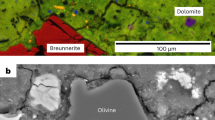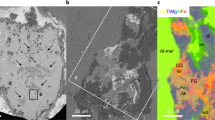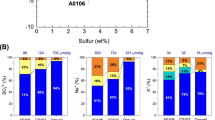Abstract
The CI meteorites are rare but important objects because they may represent our best sample of chemically unfractionated Solar System material (see, for example, ref. 1). Despite the fact that these meteorites apparently retain their original chemical composition, they clearly contain secondary mineral phases, some at least believed to have been produced through the action of liquid water on the parent body2–6. The timing of this event, however, was unknown. In an attempt to solve this problem, we have measured the Sr isotopic composition and 87Rb/86Sr in carbonates and sulphate separated from the Orgueil meteorite. Both of these phases probably precipitated from aqueous solution. Our first results, reported here, show that carbonate deposition occurred contemporaneously with parent body formation or shortly after it, probably within 100 Myr. On the other hand, at least some of the calcium sulphate seems to have been formed recently.
This is a preview of subscription content, access via your institution
Access options
Subscribe to this journal
Receive 51 print issues and online access
$199.00 per year
only $3.90 per issue
Buy this article
- Purchase on Springer Link
- Instant access to full article PDF
Prices may be subject to local taxes which are calculated during checkout
Similar content being viewed by others
References
Ebihara, M., Wolf, R. & Anders, E. Geochim. cosmochim. Acta 46, 1849–1861 (1982).
DuFresne, E. R. & Anders, E. Geochim. cosmochim. Acta 26, 1085–1114 (1962).
Nagy, B. Geol. För. Stock. Förh. 88, 235–272 (1966).
Boström, K. & Fredriksson, K. Smithson. misc. Collns 151, 1–39 (1966).
Kerridge, J. F. & Bunch, T. E. in Asteroids ed. Gehrels, T., 745–764 (University of Arizona Press, 1979).
Richardson, S. M. Meteoritics 13, 141–159 (1978).
Anders, E. & Ebihara, M. Geochim. cosmochim. Acta 46, 2363–2380 (1982).
Kerridge, J. F. Earth planet. Sci. Lett. 29, 194–200 (1976).
Kerridge, J. F., Fredriksson, K., Jarosewich, E., Nelon, J. & Macdougall, J. D. Meteoritics 15, 313–314 (abstr.) (1980).
Mittlefehldt, D. W. & Wetherill, G. W. Geochim. cosmochim. Acta 43, 201–206 (1979).
Gray, C. M., Papanastassiou, D. A. & Wasserburg, G. J. Icarus 20, 213–239 (1973).
Minster, J-F., Birck, J-L. & Allègre, C. J. Nature 300, 414–419 (1982).
Jefferey, P. M. & Anders, E. Geochim. cosmochim. Acta 34, 1175–1198 (1970).
Kerridge, J. F., Macdougall, J. D. & Marti, K. Earth planet. Sci. Lett. 43, 359–367 (1979).
Wasserburg, G. J., Tera, F., Papanastassiou, D. A. & Huneke, J. C. Earth planet. Sci. Lett. 35, 294–316 (1977).
Author information
Authors and Affiliations
Rights and permissions
About this article
Cite this article
Macdougall, J., Lugmair, G. & Kerridge, J. Early Solar System aqueous activity: Sr isotope evidence from the Orgueil CI meteorite. Nature 307, 249–251 (1984). https://doi.org/10.1038/307249a0
Received:
Accepted:
Issue Date:
DOI: https://doi.org/10.1038/307249a0
This article is cited by
-
Evidence for the late formation of hydrous asteroids from young meteoritic carbonates
Nature Communications (2012)
-
Catalytic effects of Murchison Material: Prebiotic Synthesis and Degradation of RNA Precursors
Origins of Life and Evolution of Biospheres (2011)
-
Sr isotopes in the Orgueil CI meteorite: Chronology of early solar system hydrothermal activity
Journal of Earth System Science (2000)
-
Early aqueous activity on primitive meteorite parent bodies
Nature (1996)
-
Signs of an early spring
Nature (1996)
Comments
By submitting a comment you agree to abide by our Terms and Community Guidelines. If you find something abusive or that does not comply with our terms or guidelines please flag it as inappropriate.



